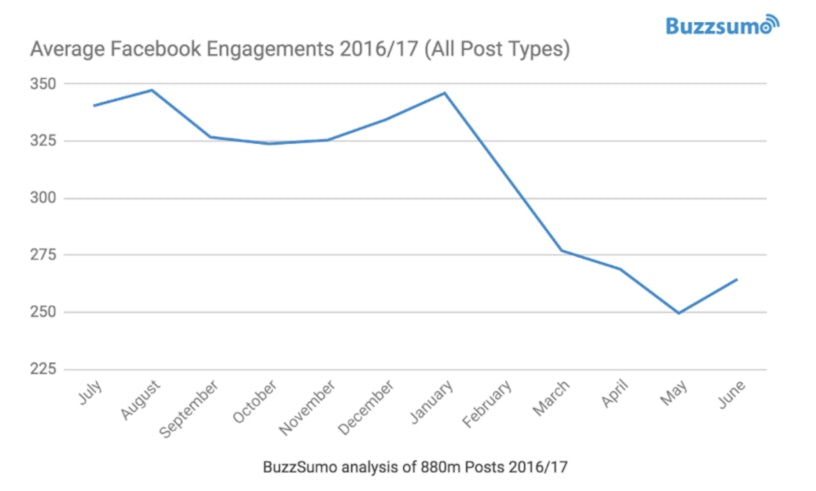Thursday 11th January, 2018, I’m sure, will go down in memory for a number of social media publishers. After all, it was on this day that Mark Zuckerberg delivered his most recent blow to brands’ organic reach on the Facebook platform.
But it’s worth noting that this isn’t the first time brands’ reach has suffered – nor, we suspect, will it be the last. In fact, the changes have been happening slowly over the past 3-4 years, incidentally as the true power of Facebook advertising has been growing.
A study by Buzzsumo and reported by Social Media Examiner last year shows how over the period of 12 months, well-established brands’ page engagements fell by 20%.

In previous shakeups, image and linked posts saw the largest decreases of engagement, whereas video continued to perform well.
What’s happening?
In short, Facebook recently ran a number of tests to demote brand page content in a user’s news feed. Originally a test, this wasn’t rolled out further. Around the same time, the Explore tab came to all users, who can use this area of the home screen for new content discovery.
Last week, Facebook published the above post confirming that friends and family content will be promoted much more into users’ feeds at the cost of branded organic content. Advertisements on the platform were not mentioned in relation to this update. Also, to be clear, branded page content isn’t being removed in totality – it’s just being toned down a noteworthy amount.
Larger brands may not feel the squeeze as much as smaller high street companies with limited interesting or high-value content to distribute, but it’s clear that news publishers and others who rely on driving traffic outside of the Facebook ecosystem will suffer.
What should I do now?
These changes have been coming for some time, and it’s other advertising agencies have undoubtedly seen this coming, too. Impression has been mastering the art of Facebook advertising since before our company launch in 2012.
We see two clear paths of investment (in terms of time, and budget):
1. Upgrade your content efforts
If you read Mark’s post carefully you’ll notice the emotive language which it contains. We’re sure this isn’t coincidental, since there are numerous studies and real-world news examples mentioning Facebook’s appreciation (or lack thereof) of emotion and social networking.
An example of this is how strongly emotive page content (in this case sponsored ads) appearing around the time of US Presidential Elections and containing divisive political ideologies, is actually considered to be a factor in Mr. Trump’s win.
This snippet from Mark’s post above speaks this angle very clearly to me:
“And the public content you see more will be held to the same standard — it should encourage meaningful interactions between people.
For example, there are many tight-knit communities around TV shows and sports teams. We’ve seen people interact way more around live videos than regular ones. Some news helps start conversations on important issues.”
For brands wishing to grow organic engagement into 2018, the requirements are clear:
- Remain topical and current
- Encourage conversations on the platform
- Be emotive
- Use more media (ideally video) content over text
- Avoid low value content, like clickbait and “tag a mate” competitions
2. Pay to play
In may respects, Facebook has been a “pay to play” network for some time now, but this latest change will surely be the impetus for change many brands have been reluctantly holding out for.
Small investments into boosted posts, or ideally via the Facebook Ads platform if budget and prowess allows, will ensure your brand message and content is delivered to a relevant audience of your choosing.
Facebook advertising costs have increased steadily as the advertising platform has become more popular in recent years, but it still offers a very compelling cost per acquisition. Its increasing ad inventory and formats is also meeting advertisers’ demands for more lead generation and shopping content.
Still, well run commercial Facebook advertising accounts can still perform extremely well (shameless plug).
Our take on this
Facebook is still a very interesting ecosystem, and it still represents a very lucrative opportunity for brands to connect with their consumers, though for commercial intent this will be almost exclusively through the paid ads platform in the future. In our opinion, this factor isn’t an entirely upsetting change, as typically good campaigns require demographic advertising anyway.
Costs may increase slightly, but we’re not expecting any large surges just yet. Social media advertising still typically offers a lower cost per acquisition (depending on the campaign type and style) when compared to paid search marketing so will remain an exciting proposition for some time.
And, as a side note, quality of ad creative, brand messaging and care around targeting will likely improve as a result of these changes, too, which is better for everyone involved.



